
"Conditions were hardly onerous within the Landsberg prison, as Hitler effectively held court there. To abate his constant and voluble expression of opinions, his companionís asked him to write a book. Unfortunately for them, he dictated the first part of Mein Kampf, his mythopoeia cum political philosophy, although that term affords this poisonous and turgid concoction a coherence it lacks. He constructed a new narrative of his political 'awakening', pushing back to his time in pre-war Vienna stances which he adopted only when he returned to Munich after the war. It is unclear what Hitler read in the way of sources. He had dabbled in the literatures of anti-Semitism, eugenics and geo-politics, although it is unknown whether this was directly or in the form of degenerated copies. Despite considerable editorial input, the book was execrably written and punctuated with mad outbursts...Autodidactic in-discipline and experience, real or imagined, created a totally inflexible worldview, in which new facts were slotted into a rigid framework. Hitler claimed that his worldview was the result of blinding revelations, of 'real' or 'higher' truths, all increasingly impervious to counter-argument or reason. As Hannah Arendt remarked: 'Ideological thinking becomes emancipated from the reality that we perceive with our five senses, and insists on a 'truer' reality concealed behind all perceptible things, dominating them from this place of concealment and requiring a sixth sense that enables us to become aware of it.' In Hitler's case, notions of biological determinism fused with an apocalyptic, conspiratorial and paranoid view of the world. He combined being the worst sort of reductionist scientific bore, forever citing cats and rats, with being a saloon-bar conspiracy theorist, forever banging on about Jews. Normally such people go quietly crazy amid genteel dilapidation, like hippies gone to seed in seaside towns. Unfortunately for humanity as a whole, this one did not." From 'The Third Reich: A New History' by Michael Burleigh.
"Hitler took the writing of Mein Kampf with great seriousness. Dietrich Eckart, Feder, and Rosenberg had all published books and pamphlets, and Hitler was anxious to establish his own position of intellectual as well as political authority in the Party. He was eager to prove that he too, even though he had never been to a university and had left school without a certificate, had read and thought deeply, acquiring his own Weltanschauung. It is this thwarted intellectual ambition, the desire to make people take him seriously as an original thinker, which accounts for the pretentiousness of the style, the use of long words and constant repetitions, all the tricks of a half-educated man seeking to give weight to his words. As a result Mein Kampf is a remarkably interesting book for anyone trying to understand Hitler's mind, but, as a party tract or a political best-seller, it was a failure, which few, even among party members, had the patience to read. --Alan Bullock, from 'Hitler: A Study in Tyranny.'
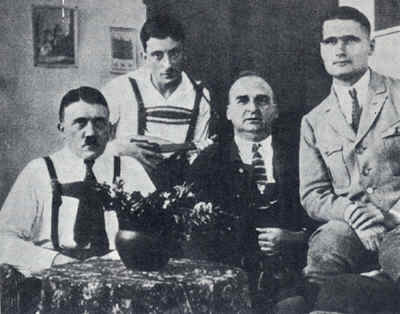
"Hitler dictated some of the opening chapters to his chauffeur, Emil Maurice, who had first come to his attention as a successful brawler in the early beer-hall meetings...but he had none of the makings of a good secretary. His position was taken over by Rudolf Hess...Like Maurice, he was one of those who first attracted Hitler's attention because he used his fists so successfully during the beer-house brawls. There the resemblance ended, for Hess had some pretensions to culture, had read widely, knew how to spell, and could put together a German sentence that was not entirely laughable...Hess' battered Remington typewriter could be heard at all hours of the day and night. The chapters were dictated, then read out at the regular meetings of the National Socialist prisoners, with Hitler inviting comments. Hitler was a speaker, not a writer, and most of the book reads like speeches taken down verbatim...Just as Hitler's speeches lack a sense of progression, for he is continually circling around a small, hard core of primitive ideas announced with complete conviction, so in Mein Kampf he disdains any reasoned argument but repeats his ideas ad nauseam, loudly, firmly, unhesitatingly, until the reader becomes deafened and almost paralyzed by the harsh music of those limited ideas." --Robert Payne, from 'The Life and Death of Adolf Hitler.'

"The first volume was published in the autumn of 1925. A work of some 400 pages, it was priced at 12 marks ( 3 dollars), about twice the price of most books brought out in Germany at that time. It did not by any means become an immediate best-seller...In his first year in office (1933) Mein Kampf sold a million copies, and Hitler's income from the royalties...was over one million marks (some $300,000), making him the most prosperous author in Germany and for the first time a millionaire. Except for the Bible, no other book sold so well during the Nazi regime, when few family households felt secure without a copy on the table...Not every German who bought a copy of Mein Kampf necessarily read it...But it might be argued that had more non-Germans read it before 1933 and had the foreign statesmen of the wold perused it carefully while there was still time, both Germany and the world might have been saved from catastrophe. For whatever other accusations can be made against Adolf Hitler, no one can accuse him of not putting down in writing exactly the kind of Germany he intended to make if he ever came to power and the kind of world he meant to create by armed German conquest. The blueprint of the Third Reich and, what is more, of the barbaric New Order which Hitler inflicted on conquered Europe in the triumphant years between 1939 and 1945 is set down in all its appalling crudity at great length and in detail between the covers of this revealing book." --William L. Shirer, from 'The Rise and Fall of the Third Reich.'

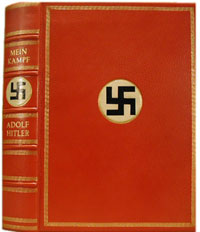
"Even Hitler's best friends said: Yes, he is an amazing speaker, probably a great leader, perhaps even a political genius - but it's a pity that he had to write this stupid book. Mein Kampf does not effectively argue Hitler's cause, because the author does not dare to express his innermost thought: that he himself is the greatest figure in history. The keynote of the book is the noisy style which signifies: Be silent, you others, I alone am right; disappear, I am the only one who matters. Trifles are said two or three times, adjectives preferably doubled. A man is 'honorable and upright,' an outlook is 'national and patriotic.' In the first edition the first volume is written almost in dialect, and the spelling is by no means above reproach. Endless heaps of substantives are intended to cover over the jargon of the Vienna lodging-house. Hitler uses few verbs, for he seldom says what happens; he always tries to create an image with his own luminous figure striding through columns of majestic substantives. He has enriched the German language with a dozen of the most hideous foreign words (hideous especially because they are not really at home in any language of the world). But even this terrifying style is not his own creation; it is borrowed from Richard Wagner's prose writings; both authors take to elaborate bombast because they fear to betray or commit themselves by a simple word. The author speaks even when he thinks nothing at all; one of the most priceless examples of empty babbling is the begining of the tenth chapter of the first volume. In the whole book hardly a single actual fact is related tangibly and credibly." Conrad Heiden, from 'Der Fuehrer.'



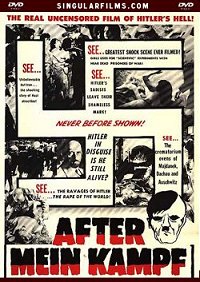
"As far as the book, Mein Kampf, is concerned, my judgment has always been the same from the very beginning as it is today. It is a book written in the worst kind of German, propaganda of a man who was strongly interested in politics, not to say a fanatical, half educated man, which to me Hitler has always been. In the book Mein Kampf and in part also in the Party program there was one point which worried me a great deal, and that was the absolute lack of understanding for all economic problems. The Party program contained a few slogans, such as "Community interests come before private interests," and so on, and then the "breaking up of subjection to financial interests" and similar phrases which could not possibly signify anything sensible. The same held true for Mein Kampf, which is of no interest from the point of view of economic policy and consequently had no interest for me. On the other hand, as regards foreign policy Mein Kampf contained, in my opinion, a great many mistakes, because it always toyed with the idea that within the continent of Europe the living space for Germany ought to be extended. And if nevertheless I did co-operate later on with a National Socialist Reich Chancellor, then it was for the very simple reason that expansion of the German space toward the East was in the book made specifically dependent upon the approval of the British Government. Therefore, to me, believing that I knew British policy very well, this seemed Utopian and there was no danger of my taking these theoretical extravagances of Hitler any more seriously than I did. It was clear to me that every territorial change on European territory attempted by force would be impossible for Germany, and would not be approved by the other nations. Besides that, Mein Kampf had a number of very silly and verbose statements but, on the other hand, it had many a reasonable idea, too; I want to point out that I liked two things especially: first, that anyone who differs with the government in political matters is obliged to state his opinion to the government; and secondly, that, though the democratic or rather parliamentary government ought to be replaced by a Fuehrer government, nevertheless the Fuehrer could only remain if he was sure of the approval of the entire people, in other words, that a Fuehrer also depended on plebiscites of a democratic nature." --Nuremberg Testimony 4-30-46, Hjalmer Schacht.
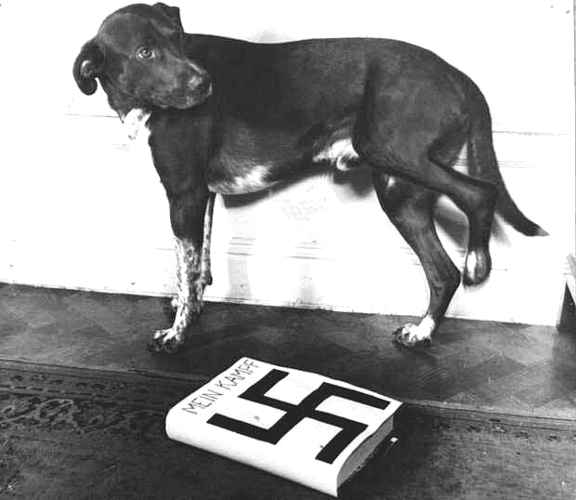
Twitter: @3rdReichStudies FB: Horrific 20th Century History



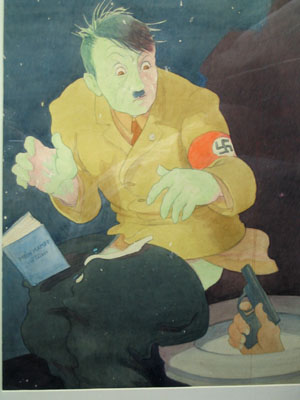
Featured Sites:Austria: The Other GermanyThe Last Days of the Third ReichAdolf Hitler: The First Super-VillianThird Reich History: What Happened Today?Countdown to Infamy: Timeline to Pearl HarborBiographical Timeline: of the Infamous Adolf HitlerCountdown To WW2: August 22 - September 1, 1939The Nuremberg Nazis: Detailed, Documented BiographiesWunderwaffen: Hitler's Deception and the History of RocketryMain Sites:
Adolf Hitler: The VolkswagenAdolf Hitler: The Fuehrer's MercedesAdolf Hitler: Mein Kampf ExaminedIn the Shadow of Frederick the GreatHitler's Battleship: Sink The Bismarck!Non-Fiction Comics: Military PeriodicalsHistory of Olympic Boycotts: From Berlin to BeijingHogan's Jews: 5 Cast Members Were Jews; Their Stories



















Disclaimer: The Propagander!™ includes diverse and controversial materials--such as excerpts from the writings of racists and anti-Semites--so that its readers can learn the nature and extent of hate and anti-Semitic discourse. It is our sincere belief that only the informed citizen can prevail over the ignorance of Racialist "thought." Far from approving these writings, The Propagander!™ condemns racism in all of its forms and manifestations.
Fair Use Notice: The Propagander!™may contain copyrighted material the use of which has not always been specifically authorized by the copyright owner. We are making such material available in our efforts to advance understanding of historical, political, human rights, economic, democracy, scientific, environmental, and social justice issues, etc. We believe this constitutes a "fair use" of any such copyrighted material as provided for in section 107 of the US Copyright Law. In accordance with Title 17 U.S.C. Section 107, the material on this site is distributed without profit to those who have expressed a prior interest in receiving the included information for research and educational purposes. If you wish to use copyrighted material from this site for purposes of your own that go beyond 'fair use', you must obtain permission from the copyright owner.

